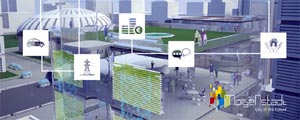50 Ideas for sustainable cities

Fraunhofer’s Morgenstadt: City Insights innovation network<br>© Fraunhofer, Fish Blowing Bubbles GmbH <br>
Since May 2012, ten Fraunhofer Institutes and numerous industrial, commercial and municipal partners have been working together to develop concepts for clean, efficient and life-enhancing urban environments.
Having analyzed six cities identified as global trendsetters for systemic urban solutions, the Morgenstadt: City Insights innovation network now presents over 100 best practices for sustainable urban development.
Cities are the key to a sustainable future. The political and economic foundations we lay today will determine the quality of tomorrow’s ecosystems and the extent to which we will be able to safeguard and protect our global resources in future. Creating sustainable cities requires technical, organizational and financial innovations, in order both to organize urban systems and to establish key business models.
These are created when stakeholders collaborate across disciplines to bring creative approaches to new technologies. Fraunhofer’s “Morgenstadt– city of the future” initiative provides the space required to facilitate this kind of innovation and active work.
The Morgenstadt: City Insights innovation network is a subproject of the Fraunhofer initiative that has analyzed six of the world’s leading cities for systemic urban solutions since May 2012. The project team examined over 100 best practices for sustainable urban development, categorized into eight research sectors. This generated 50 innovative, pioneering ideas for individual projects in smaller industrial, municipal and research consortia. At the same time, Fraunhofer researchers are using the results of this analysis to develop a tool with which to analyze urban systems’ future sustainability performance.
Researchers now intend to identify what action needs to be taken in cities around the world and what their development potential is. The Morgenstadt: City Insights innovation network’s long-term objective is to work with cities and industrial partners from January 2014 onwards to develop holistic strategies and integrated solutions that will shape the transformation of urban systems. Implementing this change successfully will entail maximizing the sustainability effect city-wide while minimizing any problems following in the wake of such fundamental transformation. This will take place as part of various research and implementation projects. Fraunhofer research concepts are benefitting industrial, municipal and research consortia in national and international city projects. A strong alliance between industry and cities will ensure that selected reference projects raise the international profile of this work at the whole-city level.
The innovation network is based on long-term cooperation between industry, the research community and cities. Among the 32 partners in the network are companies representing various sectors, such as Bosch, Daimler and EnBW, and cities such as Berlin, Düsseldorf and Freiburg. An overview of all the partners is available online at www.morgenstadt.de/en.html. Interested companies or cities are welcome to join the network as partners at any time.
Contact:
Alanus von Radecki
Urban Systems Engineering
Fraunhofer IAO
Nobelstraße 12
70569 Stuttgart, Germany
Phone +49 711 970-2169
E-Mail: alanus.radecki@iao.fraunhofer.de
Weitere Informationen:
http://www.morgenstadt.de/en.html
http://www.iao.fraunhofer.de/images/produktblaetter/morgenstadt_phase_2_en.pdf
http://www.iao.fraunhofer.de/lang-en/business-areas/mobility-and-urban-systems-engineering/1075-50-ideas-for-sustainable-cities.html
Media Contact
More Information:
http://www.iao.fraunhofer.deAll latest news from the category: Ecology, The Environment and Conservation
This complex theme deals primarily with interactions between organisms and the environmental factors that impact them, but to a greater extent between individual inanimate environmental factors.
innovations-report offers informative reports and articles on topics such as climate protection, landscape conservation, ecological systems, wildlife and nature parks and ecosystem efficiency and balance.
Newest articles

A universal framework for spatial biology
SpatialData is a freely accessible tool to unify and integrate data from different omics technologies accounting for spatial information, which can provide holistic insights into health and disease. Biological processes…

How complex biological processes arise
A $20 million grant from the U.S. National Science Foundation (NSF) will support the establishment and operation of the National Synthesis Center for Emergence in the Molecular and Cellular Sciences (NCEMS) at…

Airborne single-photon lidar system achieves high-resolution 3D imaging
Compact, low-power system opens doors for photon-efficient drone and satellite-based environmental monitoring and mapping. Researchers have developed a compact and lightweight single-photon airborne lidar system that can acquire high-resolution 3D…





















